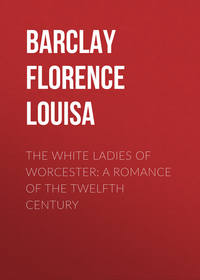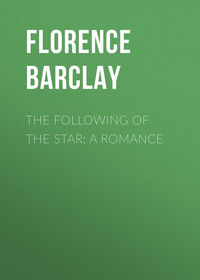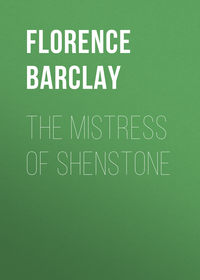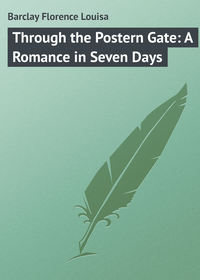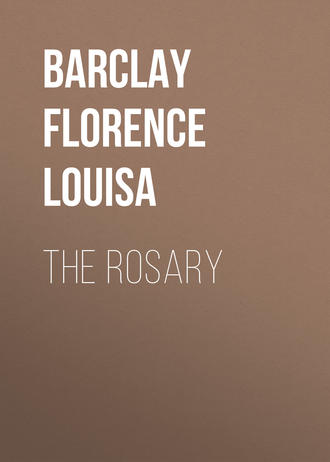 полная версия
полная версияThe Rosary
"Very fit, thank you, Dal," she answered. "At least I am every moment improving in health and spirits, now I have arrived here at last."
Garth stood his racket against the arm of her chair and deposited himself full length on the grass beside her, leaning on his elbow.
"Was anything wrong with London?" he asked, rather low, not looking up at her, but at the smart brown shoe, planted firmly on the grass so near his hand. "Nothing was wrong with London," replied Jane frankly; "it was hot and dusty of course, but delightful as usual. Something was wrong with ME; and you will be ashamed of me, Dal, if I confess what it was."
Garth did not look up, but assiduously picked little blades of grass and laid them in a pattern on Jane's shoe. This conversation would have been exactly to the point had they been alone. But was Jane really going to announce to the assembled company, in that dear, resonant, carrying voice of hers, the sweet secret of their miss of one another?
"Liver?" inquired Mrs. Parker Bangs suddenly.
"Muffins!" exclaimed Billy instantly, and, rushing for them, almost shot them into her lap in the haste with which he handed them, stumbling headlong over Garth's legs at the same moment.
Jane stared at Mrs. Parker Bangs and her muffins; then looked down at the top of Garth's dark head, bent low over the grass.
"I was dull," she said, "intolerably dull. And Dal always says 'only a dullard is dull.' But I diagnosed my dulness in the train just now and found it was largely his fault. Do you hear, Dal?"
Garth lifted his head and looked at her, realising in that moment that it was, after all, possible for a complete and overwhelming experience to be one-sided. Jane's calm grey eyes were full of gay friendliness.
"It was your fault, my dear boy," said Jane.
"How so?" queried Garth; and though there was a deep flush on his sunburned face, his voice was quietly interrogative.
"Because, during those last days at Overdene, you led me on into a time of musical dissipation such as I had never known before, and I missed it to a degree which was positively alarming. I began to fear for the balance of my well-ordered mind."
"Well," said Myra, coming out from behind her red parasol, "you and Dal can have orgies of music here if you want them. You will find a piano in the drawing-room and another in the hall, and a Bechstein grand in the billiard-room. That is where I hold the practices for the men and maids. I could not make up my mind which makers I really preferred, Erard, Broadwood, Collard, or Bechstein; so by degrees I collected one of each. And after all I think I play best upon the little cottage piano we had in the school-room at home. It stands in my boudoir now. I seem more accustomed to its notes, or it lends itself better to my way of playing."
"Thank you, Myra," said Jane. "I fancy Dal and I will like the Bechstein."
"And if you want something really exciting in the way of music," continued Lady Ingleby, "you might attend some of the rehearsals for this 'service of song' they are getting up in aid of the organ deficit fund. I believe they are attempting great things."
"I would sooner pay off the whole deficit, than go within a mile of a 'service of song,'" said Jane emphatically.
"Oh, no," put in Garth quickly, noting Myra's look of disappointment. "It is so good for people to work off their own debts and earn the things they need in their churches. And 'services of song' are delightful if well done, as I am sure this will be if Lady Ingleby's people are in it. Lawson outlined it to me this morning, and hummed all the principal airs. It is highly dramatic. Robinson Crusoe—no, of course not! What's the beggar's name? 'Uncle Tom's Cabin'? Yes, I knew it was something black. Lawson is Uncle Tom, and the vicar's small daughter is to be little Eva. Miss Champion, you will walk down with me to the very next rehearsal."
"Shall I?" said Jane, unconscious of how tender was the smile she gave him; conscious only that in her own heart was the remembrance of the evening at Overdene when she felt so inclined to say to him: "Tell me just what you want me to do, and I will do it."
"Pauline will just love to go with you," said Mrs. Parker Bangs. "She dotes on rural music."
"Rubbish, aunt!" said Miss Lister, who had slipped into an empty chair near Myra. "I agree with Miss Champion about 'services of song,' and I don't care for any music but the best."
Jane turned to her quickly, with a cordial smile and her most friendly manner. "Ah, but you must come," she said. "We will be victimised together. And perhaps Dal and Lawson will succeed in converting us to the cult of the 'service of song.' And anyway it will be amusing to have Dal explain it to us. He will need the courage of his convictions."
"Talking of something 'really exciting in the way of music,'" said Pauline Lister, "we had it on board when we came over. There was a nice friendly crowd on board the Arabic, and they arranged a concert for half-past eight on the Thursday evening. We were about two hundred miles off the coast of Ireland, and when we came up from dinner we had run into a dense fog. At eight o'clock they started blowing the fog-horn every half-minute, and while the fog-horn was sounding you couldn't hear yourself speak. However, all the programmes were printed, and it was our last night on board, so they concluded to have the concert all the same. Down we all trooped into the saloon, and each item of that programme was punctuated by the stentorian BOO of the fog-horn every thirty seconds. You never heard anything so cute as the way it came in, right on time. A man with a deep bass voice sang ROCKED IN THE CRADLE OF THE DEEP, and each time he reached the refrain, 'And calm and peaceful is my sle-eep,' BOO went the fog-horn, casting a certain amount of doubt on our expectations of peaceful sleep that night, anyway. Then a man with a sweet tenor sang OFT IN THE STILLY NIGHT, and the fog-horn showed us just how oft, namely, every thirty seconds. But the queerest effect of all was when a girl had to play a piano-forte solo. It was something of Chopin's, full of runs and trills and little silvery notes. She started all right; but when she was half-way down the first page, BOO went the fog-horn, a longer blast than usual. We saw her fingers flying, and the turning of the page, but not a note could we hear; and when the old horn stopped and we could hear the piano again, she had reached a place half-way down the second page, and we hadn't heard what led to it. My! it was funny. That went on all through. She was a plucky girl to stick to it. We gave her a good round of applause when she had finished, and the fog-horn joined in and drowned us. It was the queerest concert experience I ever had. But we all enjoyed it. Only we didn't enjoy that noise keeping right on until five o'clock next morning."
Jane had turned in her chair, and listened with appreciative interest while the lovely American girl talked, watching, with real delight, her exquisite face and graceful gestures, and thinking how Dal must enjoy looking at her when she talked with so much charm and animation. She glanced down, trying to see the admiration in his eyes; but his head was bent, and he was apparently absorbed in the occupation of tracing the broguing of her shoes with the long stalk of a chestnut leaf. For a moment she watched the slim brown hand, as carefully intent on this useless task, as if working on a canvas; then she suddenly withdrew her foot, feeling almost vexed with him for his inattention and apparent indifference.
Garth sat up instantly. "It must have been awfully funny," he said. "And how well you told it. One could hear the fog-horn, and see the dismayed faces of the performers. Like an earthquake, a fog-horn is the sort of thing you don't ever get used to. It sounds worse every time. Let's each tell the funniest thing we remember at a concert. I once heard a youth recite Tennyson's Charge of the Light Brigade with much dramatic action. But he was extremely nervous, and got rather mixed. In describing the attitude of mind of the noble six hundred, he told us impressively that it was"
"'Theirs not to make reply;Theirs not to do or die;Theirs BUT TO REASON WHY.'""The tone and action were all right, and I doubt whether many of the audience noticed anything wrong with the words."
"That reminds me," said Ronald Ingram, "of quite the funniest thing I ever heard. It was at a Thanksgiving service when some of our troops returned from South Africa. The proceedings concluded by the singing of the National Anthem right through. You recollect how recently we had had to make the change of pronoun, and how difficult it was to remember not to shout:"
"'Send HER victorious'? Well, there was a fellow just behind me, with a tremendous voice, singing lustily, and taking special pains to get the pronouns correct throughout. And when he reached the fourth line of the second verse he sang with loyal fervour."
"'Confound HIS politics, Frustrate HIS knavish tricks!'""That would amuse the King," said Lady Ingleby. "Are you sure it is a fact, Ronnie?"
"Positive! I could tell you the church, and the day, and call a whole pewful of witnesses who were convulsed by it."
"Well, I shall tell his Majesty at the next opportunity, and say you heard it. But how about the tennis? What comes next? Final for couples? Oh, yes! Dal, you and Miss Lister play Colonel Loraine and Miss Vermount; and I think you ought to win fairly easily. You two are so well matched. Jane, this will be worth watching."
"I am sure it will," said Jane warmly, looking at the two, who had risen and stood together in the evening sunlight, examining their rackets and discussing possible tactics, while awaiting their opponents. They made such a radiantly beautiful couple; it was as if nature had put her very best and loveliest into every detail of each. The only fault which could possibly have been found with the idea of them wedded, was that her dark, slim beauty was so very much just a feminine edition of his, that they might easily have been taken for brother and sister; but this was not a fault which occurred to Jane. Her whole-hearted admiration of Pauline increased every time she looked at her; and now she had really seen them together, she felt sure she had given wise advice to Garth, and rejoiced to know he was taking it.
Later on, as they strolled back to the house together,—she and Garth alone,—Jane said, simply: "Dal, you will not mind if I ask? Is it settled yet?"
"I mind nothing you ask," Garth replied; "only be more explicit. Is what settled?"
"Are you and Miss Lister engaged?"
"No," Garth answered. "What made you suppose we should be?"
"You said at Overdene on Tuesday—TUESDAY! oh! doesn't it seem weeks ago?—you said we were to take you seriously."
"It seems years ago," said Garth; "and I sincerely hope you will take me—seriously. All the same I have not proposed to Miss Lister; and I am anxious for an undisturbed talk with you on the subject. Miss Champion, after dinner to-night, when all the games and amusements are in full swing, and we can escape unobserved, will you come out onto the terrace with me, where I shall be able to speak to you without fear of interruption? The moonlight on the lake is worth seeing from the terrace. I spent an hour out there last night—ah, no; you are wrong for once—I spent it alone, when the boating was over, and thought of—how—to-night—we might be talking there together."
"Certainly I will come," said Jane; "and you must feel free to tell me anything you wish, and promise to let me advise or help in any way I can."
"I will tell you everything," said Garth very low, "and you shall advise and help as ONLY you can."
Jane sat on her window-sill, enjoying the sunset and the exquisite view, and glad of a quiet half-hour before she need think of summoning her maid. Immediately below her ran the terrace, wide and gravelled, bounded by a broad stone parapet, behind which was a drop of eight or ten feet to the old-fashioned garden, with quaint box-bordered flower-beds, winding walks, and stone fountains. Beyond, a stretch of smooth lawn sloping down to the lake, which now lay, a silver mirror, in the soft evening light. The stillness was so perfect; the sense of peace, so all-pervading. Jane held a book on her knee, but she was not reading. She was looking away to the distant woods beyond the lake; then to the pearly sky above, flecked with rosy clouds and streaked with gleams of gold; and a sense of content, and gladness, and well-being, filled her.
Presently she heard a light step on the gravel below and leaned forward to see to whom it belonged. Garth had come out of the smoking-room and walked briskly to and fro, once or twice. Then he threw himself into a wicker seat just beneath her window, and sat there, smoking meditatively. The fragrance of his cigarette reached Jane, up among the magnolia blossoms. "'Zenith,' Marcovitch," she said to herself, and smiled. "Packed in jolly green boxes, twelve shillings a hundred! I must remember in case I want to give him a Christmas present. By then it will be difficult to find anything which has not already been showered upon him."
Garth flung away the end of his cigarette, and commenced humming below his breath; then gradually broke into words and sang softly, in his sweet barytone:
"'It is not mine to sing the stately grace,The great soul beaming in my lady's face.'"The tones, though quiet, were so vibrant with passionate feeling, that Jane felt herself an eavesdropper. She hastily picked a large magnolia leaf and, leaning out, let it fall upon his head. Garth started, and looked up. "Hullo!" he said. "YOU—up there?"
"Yes," said Jane, laughing down at him, and speaking low lest other casements should be open, "I—up here. You are serenading the wrong window, dear 'devout lover.'"
"What a lot you know about it," remarked Garth, rather moodily.
"Don't I?" whispered Jane. "But you must not mind, Master Garthie, because you know how truly I care. In old Margery's absence, you must let me be mentor."
Garth sprang up and stood erect, looking up at her, half-amused, half-defiant.
"Shall I climb the magnolia?" he said. "I have heaps to say to you which cannot be shouted to the whole front of the house."
"Certainly not," replied Jane. "I don't want any Romeos coming in at my window. 'Hoity-toity! What next?' as Aunt 'Gina would say. Run along and change your pinafore, Master Garthie. The 'heaps of things' must keep until to-night, or we shall both be late for dinner."
"All right," said Garth, "all right. But you will come out here this evening, Miss Champion? And you will give me as long as I want?"
"I will come as soon as we can possibly escape," replied Jane; "and you cannot be more anxious to tell me everything than I am to hear it. Oh! the scent of these magnolias! And just look at the great white trumpets! Would you like one for your buttonhole?"
He gave her a wistful, whimsical little smile; then turned and went indoors.
"Why do I feel so inclined to tease him?" mused Jane, as she moved, from the window. "Really it is I who have been silly this time; and he, staid and sensible. Myra is quite right. He is taking it very seriously. And how about her? Ah! I hope she cares enough, and in the right way.—Come in, Matthews! And you can put out the gown I wore on the night of the concert at Overdene, and we must make haste. We have just twenty minutes. What a lovely evening! Before you do anything else, come and see this sunset on the lake. Ah! it is good to be here!"
CHAPTER X
THE REVELATION
All the impatience in the world could not prevent dinner at Shenstone from being a long function, and two of the most popular people in the party could not easily escape afterwards unnoticed. So a distant clock in the village was striking ten, as Garth and Jane stepped out on to the terrace together. Garth caught up a rug in passing, and closed the door of the lower hall carefully behind him.
They were quite alone. It was the first time they had been really alone since these days apart, which had seemed so long to both.
They walked silently, side by side, to the wide stone parapet overlooking the old-fashioned garden. The silvery moonlight flooded the whole scene with radiance. They could see the stiff box-borders, the winding paths, the queerly shaped flower-beds, and, beyond, the lake, like a silver mirror, reflecting the calm loveliness of the full moon.
Garth spread the rug on the coping, and Jane sat down. He stood beside her, one foot on the coping, his arms folded across his chest, his head erect. Jane had seated herself sideways, turning towards him, her back to an old stone lion mounting guard upon the parapet; but she turned her head still further, to look down upon the lake, and she thought Garth was looking in the same direction.
But Garth was looking at Jane.
She wore the gown of soft trailing black material she had worn at the Overdene concert, only she had not on the pearls or, indeed, any ornament save a cluster of crimson rambler roses. They nestled in the soft, creamy old lace which covered the bosom of her gown. There was a quiet strength and nobility about her attitude which thrilled the soul of the man who stood watching her. All the adoring love, the passion of worship, which filled his heart, rose to his eyes and shone there. No need to conceal it now. His hour had come at last, and he had nothing to hide from the woman he loved.
Presently she turned, wondering why he did not begin his confidences about Pauline Lister. Looking up inquiringly, she met his eyes.
"Dal!" cried Jane, and half rose from her seat. "Oh, Dal,—don't!"
He gently pressed her back. "Hush, dear," he said. "I must tell you everything, and you have promised to listen, and to advise and help. Ah, Jane, Jane! I shall need your help. I want it so greatly, and not only your help, Jane—but YOU—you, yourself. Ah, how I want you! These three days have been one continual ache of loneliness, because you were not there; and life began to live and move again, when you returned. And yet it has been so hard, waiting all these hours to speak. I have so much to tell you, Jane, of all you are to me—all you have become to me, since the night of the concert. Ah, how can I express it? I have never had any big things in my life; all has been more or less trivial—on the surface. This need of you—this wanting you—is so huge. It dwarfs all that went before; it would overwhelm all that is to come,—were it not that it will be the throne, the crown, the summit, of the future.—Oh, Jane! I have admired so many women. I have raved about them, sighed for them, painted them, and forgotten them. But I never LOVED a woman before; I never knew what womanhood meant to a man, until I heard your voice thrill through the stillness—'I count each pearl.' Ah, beloved, I have learned to count pearls since then, precious hours in the past, long forgotten, now remembered, and at last understood. 'Each hour a pearl, each pearl a prayer,' ay, a passionate plea that past and present may blend together into a perfect rosary, and that the future may hold no possibility of pain or parting. Oh, Jane—Jane! Shall I ever be able to make you understand—all—how much—Oh, JANE!"
She was not sure just when he had come so near; but he had dropped on one knee in front of her, and, as he uttered the last broken sentences, he passed both his arms around her waist and pressed his face into the soft lace at her bosom. A sudden quietness came over him. All struggling with explanations seemed hushed into the silence of complete comprehension—an all-pervading, enveloping silence.
Jane neither moved nor spoke. It was so strangely sweet to have him there—this whirlwind of emotion come home to rest, in a great stillness, just above her quiet heart. Suddenly she realised that the blank of the last three days had not been the miss of the music, but the miss of HIM; and as she realised this, she unconsciously put her arms about him. Sensations unknown to her before, awoke and moved within her,—a heavenly sense of aloofness from the world, the loneliness of life all swept away by this dear fact—just he and she together. Even as she thought it, felt it, he lifted his head, still holding her, and looking into her face, said: "You and I together, my own—my own."
But those beautiful shining eyes were more than Jane could bear. The sense of her plainness smote her, even in that moment; and those adoring eyes seemed lights that revealed it. With no thought in her mind but to hide the outward part from him who had suddenly come so close to the shrine within, she quickly put both hands behind his head and pressed his face down again, into the lace at her bosom. But, to him, those dear firm hands holding him close, by that sudden movement, seemed an acceptance of himself and of all he had to offer. For ten, twenty, thirty exquisite seconds, his soul throbbed in silence and rapture beyond words. Then he broke from the pressure of those restraining hands; lifted his head, and looked into her face once more.
"My wife!" he said.
Into Jane's honest face came a look of startled wonder; then a deep flush, seeming to draw all the blood, which had throbbed so strangely through her heart, into her cheeks, making them burn, and her heart die within her. She disengaged herself from his hold, rose, and stood looking away to where the still waters of the lake gleamed silver in the moonlight.
Garth Dalmain stood beside her. He did not touch her, nor did he speak again. He felt sure he had won; and his whole soul was filled with a gladness unspeakable. His spirit was content. The intense silence seemed more expressive than words. Any ordinary touch would have dimmed the sense of those moments when her hands had held him to her. So he stood quite still and waited.
At last Jane spoke. "Do you mean that you wish to ask me to be—to be THAT—to you?"
"Yes, dear," he answered, gently; but in his voice vibrated the quiet of strong self-control. "At least I came out here intending to ask it of you. But I cannot ask it now, beloved. I can't ask you TO BE what you ARE already. No promise, no ceremony, no giving or receiving of a ring, could make you more my wife than you have been just now in those wonderful moments."
Jane slowly turned and looked at him. She had never seen anything so radiant as his face. But still those shining eyes smote her like swords. She longed to cover them with her hands; or bid him look away over the woods and water, while he went on saying these sweet things to her. She put up one foot on the low parapet, leaned her elbow on her knee, and shielded her face with her hand. Then she answered him, trying to speak calmly.
"You have taken me absolutely by surprise, Dal. I knew you had been delightfully nice and attentive since the concert evening, and that our mutual understanding of music and pleasure in it, coupled with an increased intimacy brought about by our confidential conversation under the cedar, had resulted in an unusually close and delightful friendship. I honestly admit it seems to have—it has—meant more to me than any friendship has ever meant. But that was partly owing to your temperament, Dal, which tends to make you always the most vivid spot in one's mental landscape. But truly I thought you wanted me out here in order to pour out confidences about Pauline Lister. Everybody believes that her loveliness has effected your final capture, and truly, Dal, truly—I thought so, too." Jane paused.
"Well?" said the quiet voice, with its deep undertone of gladness. "You know otherwise now."
"Dal—you have so startled and astonished me. I cannot give you an answer to-night. You must let me have until to-morrow—to-morrow morning."
"But, beloved," he said tenderly, moving a little nearer, "there is no more need for you to answer than I felt need to put a question. Can't you realise this? Question and answer were asked and given just now. Oh, my dearest—come back to me. Sit down again."
But Jane stood rigid.
"No," she said. "I can't allow you to take things for granted in this way. You took me by surprise, and I lost my head utterly—unpardonably, I admit. But, my dear boy, marriage is a serious thing. Marriage is not a mere question of sentiment. It has to wear. It has to last. It must have a solid and dependable foundation, to stand the test and strain of daily life together. I know so many married couples intimately. I stay in their homes, and act sponsor to their children; with the result that I vowed never to risk it myself. And now I have let you put this question, and you must not wonder if I ask for twelve hours to think it over."


